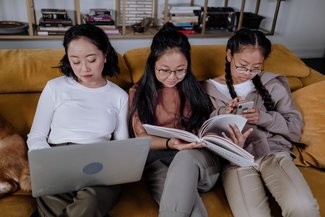
Girls Speak
Agenda Alliance's campaign to ensure girls and young women facing inequality, poverty and violence get the support and protection they need.

8 Dec 2020
By Maggie Bridge, Senior Policy and Engagement Officer at Agenda
"I just think, like, as girls… I feel like we have to… prove ourselves but I don’t think it should be like that. I think we should just be able to say something and for people to believe us." - Lucy, 19
Overlooked in research, policy and practice, girls and young women facing the greatest forms of inequality and disadvantage are often misunderstood, ignored and disbelieved. We hear little about the realities of their lives, their experiences of systems and services, and the combinations of problems they face – their experiences of violence and abuse, struggles with mental health, use of drugs and alcohol, experience of the care system, worries about money, exclusion from school and contact with the criminal justice. As a result, decision-makers rarely afford their needs and vulnerabilities sustained attention.
Young women know this too. A survey conducted by Young Women’s Trust found that only 8% of young women feel the government is addressing their needs and young women speaking to Agenda say that both professionals and people in their social circles regularly dismiss them. This can have a devastating effect.
Emma, who is 21, says her experience of domestic abuse was “pushed under the carpet” – she was disbelieved by her family and scared to approach her doctor for fear of being dismissed. Now though – having received support from a specialist service for girls and young women – she feels ready to share her experience with others, and she knows what needs to change.
Agenda’s Girls Speak campaign shines a light on the experiences of some of the most marginalised girls and young women (14–24) in England and Wales. Many of these girls and young women are written off as “difficult to engage” or “hard to reach”. This has been far from our experience. We believe that girls and young women facing complex combinations of problems are experts in their own lives, and have important insights to share about the kind of support they need and deserve.
We have been in touch with girls and young women across the country and have recently held the first few meetings of our young women’s advisory group via Zoom. Emma is a member of the group and tells me she feels really positive about being included in conversations about the challenges facing girls and young women. Lily is 22 and also a member. She says it feels good to make her voice heard at the highest levels –
“I feel like its really easy to feel like [the] government make decisions and you’re not involved but it affects you… It’s quite nice to have a voice and feel like you’re being heard…”.
Girls and young women know there is power in sharing their stories and expertise – both in the safe space of our young women’s advisory group, and more publicly. With young women from Project Catalyst challenging stigma around child sexual abuse in Portsmouth, The Angelou Centre in Newcastle running a Black feminist leadership course for their Young Women’s Network, and young women in Epsom taking a stand against sexual assault in their local area, growing numbers of girls and young women are getting involved in and setting up their own campaigns.
The young women we work with share this drive and sense of urgency. Marie is 23 and also a member of our advisory group – she wants to draw on the knowledge she has gained from some of her most difficult experiences “to change things for girls and young women, because we need it”. Kym is 19 and finds being part of the group empowering. She knows that her involvement in our Girls Speak campaign will mean that more young women feel able to follow in her footsteps –
“I love that we get to be a part of it, I feel like it’s really important and it will help get more young women [involved] – designed by young women for young women!”
We know that campaigning alongside young women is the only way to ensure that our work reflects and positively impacts girls’ and young women’s lives. Recently, we have been working on the development of our Girls Speak logo and brand, exploring what ‘campaigning’ means to us as a group.
There is more work to do. We want to make sure that girls and young women with lived experience of the issues we campaign on have a say in all aspects of our work. Not just the issues we choose to focus on and the way we talk about them, but how we come up with, recruit for and run our campaigns – from start to end. We also want to make sure decision-makers recognise girls and young women’s potential and are finding ways to ensure their voices get heard at the highest levels. Girls and young women have crucial information and opinions to share, and they are already speaking out. It is vital we start to listen.
“When I was in school I was so shy, I was so afraid to talk. Whereas now, I’ve kind of grown up – I don’t care what people say about me now. […] I will speak my opinion.” - Chloe